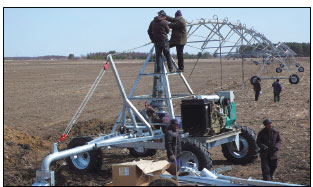Country focuses on eco-friendly farming
Fertilizers and pesticides have done so much damage to China's ecosystem and caused such an array of food safety issues that their use is to be capped from 2020.
China feeds its huge population with very limited agricultural resources. Annual grain output has grown for 11 consecutive years, but those achievements have come at great cost. The target to reduce fertilizer and pesticide use is part of a national drive for efficient, eco-friendly farming.
According to the Ministry of Agriculture, at least 16 percent of China's soil contains more pollutants than national standards allow; less than one-third of fertilizers and pesticides are absorbed by crops; less than two-thirds of plastic film is recycled; less than half of livestock and poultry waste is processed; and straw burning is still widespread. This all adds up to an agronomic nightmare and an environmental situation staggering from bad to worse.
The ministry is also concerned about desertification, shrinking water resources, industrial contamination and maintaining sufficient arable land.
The State Council recently announced a plan to improve low-yield farmland and increase irrigation. Less water must be used in agriculture and treatment of sewage and waste must improve, the plan said. Fertilizers and pesticides are just a small part of a big problem.
In China, natural resources are limited and moderate economies of scale can cut the cost of management and reduce fertilizers and pesticides, according to Li Guoxiang, a researcher with the rural development institute under the Chinese Academy of Social Sciences.
According to the development plan released by the ministry in May, by 2030, resources should be used more efficiently and frugally and the natural environment in agricultural regions should be sound, with yields stable.
Since the beginning of this year, China has been experimenting with self-sufficiency by combining crops with livestock in some northern regions.
Instead of using fertilizers and pesticides, a company in Heilongjiang has experimented with raising ducks in rice paddies. The ducks eat weeds and pests while stimulating the growth of rice as they swim. The ducks' droppings are also an organic fertilizer that provides everything rice needs.
|
Farmers in Heilongjiang province install water-saving irrigation facilities during the off-season.Qiu Qilong / For China Daily |
(China Daily 07/31/2015 page22)















